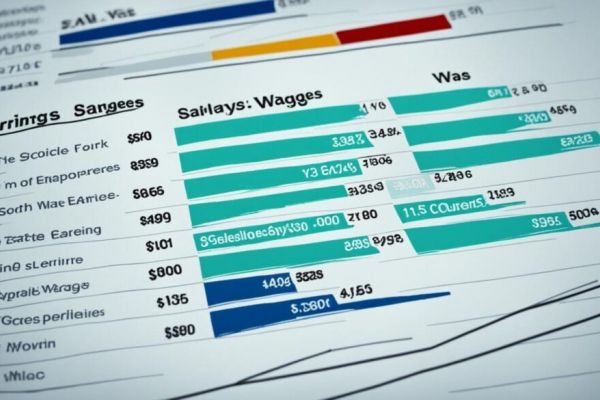Welcome to our comprehensive guide on the state of salaries in South Carolina. In this article, we will explore the average earnings and hourly wages in the state, as well as provide valuable salary information and data. Whether you are a job seeker, an employer, or simply curious about the economic landscape of South Carolina, this article will provide you with the insights you need.
Key Takeaways:
Page Contents
- 1 Occupational Groups and Salaries in South Carolina
- 2 Living Wage in South Carolina
- 3 Payment of Wages in South Carolina
- 4 Medium and Timing of Wage Payment
- 5 Payment of Wages for Discharged Employees
- 6 Unconditional Payment of Conceded Wages
- 7 Investigation of Wage Violations and Dispute Resolution
- 8 Violations, Penalties, and Civil Actions
- 9 Collection of Penalties and Prohibition of Private Agreements
- 10 Right to Enter and Conduct Investigations
- 11 Violations, Penalties, and Administrative Review
- The average annual wage in South Carolina exceeded $50,000 for the first time in 2022.
- The highest-paid occupational group in the state is Management, with an average hourly wage of $52.81.
- Healthcare practitioners and technical occupations earn more than $293,000 annually.
- Retail salespersons hand laborers and movers are among the most common occupations in South Carolina.
- The living wage varies depending on household composition, ranging from $16.73 to $50.56 per hour.
Occupational Groups and Salaries in South Carolina
When it comes to occupations and salaries in South Carolina, some interesting trends and patterns emerge. Let’s take a closer look at the most common individual occupations and the highest-paying occupational groups in the state.
Most Common Individual Occupations
Two of the most common individual occupations in South Carolina are retail salespersons hand laborers and movers. With 63,890 workers, retail salespersons earned an average hourly wage of $14.59. On the other hand, hand laborers and movers, with 63,570 workers, earned an average hourly wage of $16.64.
Highest Paying Occupational Groups
South Carolina offers lucrative opportunities in several high-paying occupational groups. The top-paying groups in the state include:
- Management: With an average annual salary ranging from $68,335 to $101,885, management positions in South Carolina provide excellent earning potential for professionals in various industries.
- Business & Financial Operations: This occupational group offers competitive salaries, with individuals in roles such as financial analysts and human resources specialists earning average annual salaries of $64,430 and $62,390, respectively.
- Computer & Mathematical: The tech industry is thriving in South Carolina, with computer and mathematical occupations offering average yearly salaries ranging from $63,260 to $82,460.
- Architecture & Engineering: Professionals in this field enjoy average annual salaries between $67,800 and $94,150, depending on their specific roles.
These high-paying occupational groups not only provide financial stability but also showcase the diverse career opportunities available in South Carolina.
Living Wage in South Carolina
In South Carolina, the concept of a living wage is essential to determine the income needed to support oneself and a family. The living wage varies depending on the number of adults and children in a household, providing a benchmark for a decent standard of living.
For a single adult in South Carolina, the living wage is $16.73 per hour. This hourly rate allows individuals to meet their basic needs, maintain a reasonable quality of life, and cover essential expenses such as housing, transportation, food, and healthcare.
For households with two working adults and three children, the living wage increases to $50.56 per hour. This higher rate takes into account the additional expenses associated with raising a family, including childcare, education, and other family-related costs.
It is important to note that the living wage reflects the minimum amount needed to meet basic needs and does not include discretionary spending or savings. It provides an overview of the income required to live comfortably in South Carolina.
On the other end of the spectrum, the poverty wage in South Carolina ranges from $6.53 to $13.34 per hour. This range represents the income level below which individuals and families are considered to be living in poverty, struggling to meet their basic needs.
As illustrated in the table below, the living wage in South Carolina is significantly higher than the poverty wage, highlighting the gap between minimum survival income and a wage that allows for a reasonable quality of life.
| Household Composition | Living Wage | Poverty Wage |
|---|---|---|
| Single Adult | $16.73/hour | $6.53 – $13.34/hour |
| Two Working Adults + Three Children | $50.56/hour | $6.53 – $13.34/hour |
The living wage and poverty wage figures shed light on the income disparities within South Carolina and the challenges faced by individuals and families striving to make ends meet. By understanding these statistics, policymakers, employers, and organizations can work towards creating a more equitable society where all residents have access to a dignified standard of living.
Payment of Wages in South Carolina
When it comes to payment of wages in South Carolina, employers must adhere to the state’s labor and employment laws. These laws ensure fair and legal payment practices for employees.
According to these laws:
- Wages must be paid in lawful United States currency or by negotiable warrant or check, providing employees with a secure and acceptable form of payment.
- Employers are required to provide written notice to employees, outlining the agreed-upon hours, wages, and deductions. This helps establish clear expectations and ensures transparency in the payment process.
- Employers must maintain records of employee names, addresses, wages paid, and deductions made for three years. This record-keeping requirement helps protect both employers and employees in the event of disputes or inquiries.
- Employees have the right to receive itemized statements of their gross pay and deductions for each pay period. This allows them to review and verify their earnings, ensuring accuracy and promoting trust between employers and employees.
Ensuring compliance with these payment regulations is essential to maintaining a fair and transparent work environment in South Carolina.
Sample Table: Average Government Salaries in South Carolina
| Government Position | Annual Salary |
|---|---|
| Governor | $106,078 |
| State Senator | $25,000 |
| State Representative | $20,000 |
| Supreme Court Justice | $165,547 |
| State Patrol Officer | $43,789 |
This sample table illustrates the average salaries for various government positions in South Carolina. Please note that these figures are for illustrative purposes only and may not reflect actual salaries. For accurate and up-to-date salary information, it is recommended to consult official sources or reliable salary databases.
“Fair and timely payment of wages is not only a legal requirement but also a fundamental aspect of job satisfaction and employee well-being. Employers have a responsibility to ensure that their workers are compensated fairly and transparently.”
Medium and Timing of Wage Payment
Employers in South Carolina have specific requirements regarding the medium and timing of wage payment. To ensure compliance with state regulations, employers must adhere to the following guidelines:
- Wages must be paid in lawful United States currency, negotiable warrants, or checks.
- Direct deposit into an employee’s bank account is also an acceptable payment method.
- Employers are prohibited from withholding or diverting any portion of an employee’s wages without written notification or a lawful reason.
- Wages must be paid at the designated time and place specified at the time of hiring.
By following these guidelines, employers not only ensure compliance with state laws but also uphold the financial security of their employees.
Payment of Wages for Discharged Employees
When an employer separates an employee from the payroll, they must pay all wages due within 48 hours of the separation or on the next regular payday, which cannot exceed 30 days. This ensures that employees receive their final wages promptly upon termination.
Payment of Wages for Discharged Employees – Summary
Upon employee separation, wages owed must be paid within 48 hours or on the next regular payday within 30 days.
| Payment Timeline | Wages Due |
|---|---|
| Within 48 hours of separation | All outstanding wages |
| Next regular payday, within 30 days | All outstanding wages |
Unconditional Payment of Conceded Wages
In cases where wage disputes arise between employers and employees in South Carolina, employers are required to provide written notice to employees of the amount of wages they concede to be due.
Once the concession is made, employers must then make unconditional payment of the conceded wages within the specified time frame.
It’s important to note that acceptance of the payment does not release the employer from the balance of the employee’s claim.
“Whether you’re a worker waiting for your rightful pay or an employer looking to resolve a wage dispute, it’s essential to understand the process of conceding and paying wages in South Carolina. By adhering to the state’s guidelines, both parties can work towards a fair resolution.”
Example Case: Conceded Wages
To illustrate the process of unconditional payment of conceded wages, consider the following scenario:
John, an employee at XYZ Company, believes that he is owed $500 in unpaid wages. After discussing the issue with his employer, they both come to an agreement that $300 of the claimed amount is indeed owed. The employer provides a written notice to John, conceding the $300 and specifying a payment deadline of two weeks.
As per the agreement, within the specified time frame, the employer pays John the full $300 without any conditions. However, this payment does not release the employer from the remaining $200 of John’s initial claim. If necessary, further action may be taken to address the outstanding amount.
| Employee Name | Wage Claimed | Conceded Amount | Payment Deadline | Unconditional Payment |
|---|---|---|---|---|
| John | $500 | $300 | Two weeks | Full $300 without conditions |
Investigation of Wage Violations and Dispute Resolution
When it comes to ensuring fair payment practices, the Director of the Department of Labor, Licensing, and Regulation, or their designee, plays a crucial role in investigating alleged wage violations in South Carolina. With the authority vested in them, they can conduct thorough investigations to uphold the rights of workers.
If a violation is found, the director follows a proactive approach by attempting to resolve the issue through informal methods of mediation and conciliation. This approach aims to address any disputes promptly and efficiently, minimizing the need for lengthy legal proceedings.
“Our priority is to protect the interests of employees and maintain a fair and just work environment. By employing mediation and conciliation techniques, we strive for amicable resolutions that benefit both employers and employees.”
Through the expertise and authority of the Director of the Department of Labor, Licensing, and Regulation, wage disputes and violations can be thoroughly investigated and resolved, ensuring a level playing field for workers across South Carolina.
Advantages of Informal Resolution Methods
Informal resolution methods, such as mediation and conciliation, offer several benefits:
- Efficiency: Resolving wage disputes through informal means can save time and resources compared to formal legal proceedings.
- Flexibility: Parties involved in the dispute have the opportunity to discuss potential solutions and negotiate mutually agreeable outcomes.
- Preservation of Relationships: By promoting open communication and collaboration, informal resolutions have the potential to maintain positive working relationships between employers and employees.
By employing these methods, the Director of the Department of Labor, Licensing, and Regulation aims to foster a harmonious work environment where wage disputes can be resolved promptly and fairly.
Violations, Penalties, and Civil Actions
Employers who violate wage payment provisions in the state of South Carolina may face penalties and legal consequences. The Director of the Department of Labor, Licensing, and Regulation has the authority to enforce these provisions and ensure fair compensation for employees.
For the first offense, the Director will issue a written warning to the employer, indicating the violation and the need for compliance. However, subsequent offenses may result in more severe consequences, such as civil penalties.
| Offense | Potential Penalty |
|---|---|
| First | Written warning from the Director |
| Subsequent | Civil penalties of up to $100 per violation |
Employees who haven’t received wages as required by law have the right to pursue civil actions against their employers. They can take legal steps to recover their unpaid wages, seeking potential damages of up to three times the full amount owed. Additionally, employees may be entitled to reimbursement for costs incurred and attorney’s fees.
In cases where wage violations occur, the Director of the Department of Labor, Licensing, and Regulation holds the authority to review and assess civil penalties. This ensures that employers are held accountable for their wage practices, and employees are rightfully compensated for their work.
Key Takeaways:
- Employers who violate wage payment provisions in South Carolina may face penalties and legal consequences.
- The Director of the Department of Labor, Licensing, and Regulation has the authority to issue warnings and assess civil penalties.
- Employees have the right to pursue civil actions to recover unpaid wages, potentially receiving damages and reimbursement for costs and attorney’s fees.
As employees, it’s important to be aware of your rights and the protections available to you when it comes to wage payment. Remember to consult the relevant labor laws and seek legitimate remedies if you believe your employer has violated your rights to fair compensation.
Collection of Penalties and Prohibition of Private Agreements
Ensuring compliance with wage payment laws is a crucial aspect of maintaining fair employment practices in South Carolina. To deter violations, the Director of the Department of Labor, Licensing, and Regulation has the authority to assess civil penalties against non-compliant employers. However, these penalties must be collected within a specified timeframe to effectively enforce the consequences.
If an assessed civil penalty remains unpaid after 60 days, the Director may initiate action to collect the penalty from the employer. This proactive approach ensures that penalties are not simply ignored, as it directly impacts the employer’s financial obligations. By taking these measures, South Carolina aims to prioritize the timely payment of penalties and discourage non-compliance.
It is important to note that the amounts collected from these penalties are deposited into the general fund of the state. This allocation ensures that the funds are utilized for various public services and initiatives that benefit the community as a whole.
In addition to the collection of penalties, South Carolina prohibits private agreements that contradict or undermine the provisions of the state’s wage payment laws. This prohibition safeguards the rights and interests of employees, preventing employers from circumventing their obligations through private arrangements. It enforces the fair and consistent application of wage payment laws, further reinforcing the commitment to promoting equitable employment practices in the state.
Right to Enter and Conduct Investigations
Ensuring compliance with state wage payment laws is a top priority for the Director of the Department of Labor, Licensing, and Regulation in South Carolina. To fulfill this mandate, the Director, along with designated inspectors, agents, or representatives, is granted the right to enter workplaces at reasonable times and conduct thorough investigations.
Upon entering a workplace, these authorized individuals have the authority to question employers, owners, managers, and employees regarding wage payment compliance. They can inspect records, documents, and any relevant evidence to gather the necessary information for their investigations.
This right to enter and conduct investigations allows the Director and their team to actively monitor and enforce the adherence to wage payment laws across various industries and sectors in South Carolina.
By conducting on-site visits and engaging with key stakeholders, such as employers and employees, the Director can gather firsthand information, address any concerns, and ensure that employers are meeting their obligations under state law.
Empowering Employee Rights and Protecting Fair Wages
This crucial function of the Department of Labor, Licensing, and Regulation plays a vital role in protecting the rights of workers and maintaining fair wage practices throughout South Carolina.
In a society that values fairness and equality, it is essential to have vigilant regulatory bodies that can verify compliance with wage payment laws. By exercising their authority to enter workplaces and conduct investigations, the Director and their team work toward creating an environment where employees receive the wages they deserve and employers meet their legal obligations.
Through these proactive measures, South Carolina aims to foster a fair and just labor market, ensuring that workers receive the compensation they are entitled to and maintaining the integrity of the state’s wage payment system.
Violations, Penalties, and Administrative Review
Employers who fail to comply with wage payment laws in the state of South Carolina may be subject to civil penalties. These penalties are assessed by the Director of the Department of Labor, Licensing, and Regulation, who has the authority to enforce compliance. Violations may result in fines and other consequences to ensure fair treatment and protection of workers.
Additionally, administrative review procedures are in place to review and challenge any civil penalties that have been assessed. This allows employers to present their case and provide any necessary documentation or evidence to support their position. It ensures a fair and unbiased process for both employers and employees.
By implementing such administrative review procedures, the state of South Carolina emphasizes the importance of proper wage payment practices. It serves as a deterrent for employers who may consider violating wage payment laws and helps to maintain a fair and just working environment for all employees.
Also Read, Viggo Sorensen, Avivasofia, and Giselle Guilmette.





